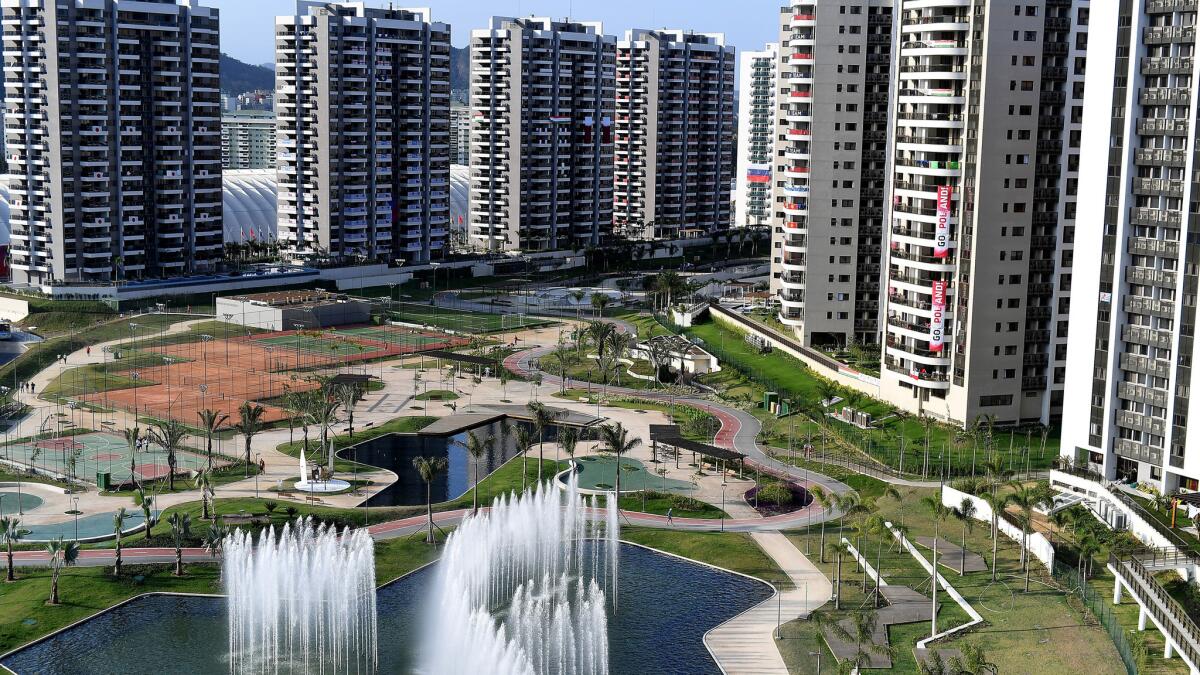Much is at stake for Brazil as it takes center stage in the Olympics

- Share via
Reporting from Rio de Janeiro — There is a long-standing joke about Brazil and its reputation as an emerging political and economic force in the world: “Brazil is the country of the future … and always will be.”
That’s why the 2016 Summer Olympics are so crucial not only to the host city of Rio de Janeiro but also to the nation and the region.
With international media gathered here and billions watching on television, there is much at stake over the next 17 days.
“Will Brazil be recognized as a country ready to make its mark?” asked Lowell Gustafson, a humanities and social sciences professor at Villanova University. “Or will it be recognized for overreaching and sliding back into this Third-World status?”
The answer remains in doubt given a litany of setbacks Brazil has suffered. There has been a historic recession and political upheaval. In Rio, water pollution, civic unrest and the outbreak of the Zika virus have been persistent concerns.
Two years ago, a top International Olympic Committee official called preparations for these Games “the worst” he had ever seen and, for the first time, the organization sent a team of experts to monitor the buildup.
As Friday’s opening ceremony draws near, Brazilians are feeling the pressure.
“It is not only the country that organizes the Games, but all the regions around will have the legacy,” said Carlos Nuzman, president of the Rio 2016 committee. “It is very, very important to show the capacity we have to deliver.”
When the IOC voted to select Rio as a host in 2009 — sending the Games to South America for the first time — Brazil had a booming economy and was considered a model for emerging nations. As an agricultural superpower and natural-resources giant, the country was shipping vast quantities of commodities to China and attracting interest from international investors.
This economic success helped tens of millions of citizens rise out of poverty.
The situation in Brazil has turned dark as a downturn in commodities and oil prices has fueled the worst recession in perhaps a century. A recent scandal has implicated much of the country’s business and political elite in a multi-billion-dollar corruption scheme.
Former President Luiz Inacio Lula da Silva, the charismatic leader who helped win the Olympic bid, could be arrested during the Games. His successor, Dilma Rousseff, faces an impeachment trial.
Brazil has significant markets outside the Western Hemisphere … and this is another way to develop that.
— Lowell Gustafson, humanities and social sciences professor at Villanova University

Hosting the Olympics figured to cost billions, so it wasn’t a sound financial investment, at least not in the short run. Still, government and sports officials saw potential long-term benefits.
“Rio was a city that for the last 50 years had nothing since it lost the status of being the capital city,” Nuzman said, referring to the federal government’s shift to Brasilia in 1960.
Despite the promise of infrastructure upgrades and legacy facilities, the Olympics often leaves a city with a burden of debt that is difficult to escape. Giant multi-venue complexes in Sydney, Athens and Sochi, Russia, stand nearly vacant, leaving those cities with visible reminders that the magic of a Games doesn’t always stick around.
Beijing was somewhat of an exception, the Olympics there were used to successfully build on the region’s growing international status. In 2022, the Games return to Beijing, which will become the first city to ever host both summer and winter Games.
Rio and Brazil were — and still are — hoping to use the Olympics to prove their readiness for prime time. The international competition, which draws athletes and fans from hundreds of nations and scores of corporate sponsors, offers the allure of new, valuable contacts.
“I don’t think it’s only symbolic,” Gustafson said. “Brazil has significant markets outside the Western Hemisphere … and this is another way to develop that.”
There is also the matter of national pride as host countries look to make a big splash, said Anita DeFrantz, a long-time IOC member from Los Angeles.
“The world will see them in a different way,” DeFrantz said. “There’s immense value that comes from this.”
With Rio 2016 running low on funds and scrambling to cut as much as $500 million from the budget, there have been doubts about whether the Games will come off as planned.
“These were not always easy times,” IOC President Thomas Bach said Thursday. “And they are not easy times as we speak.”
Security is always a concern at the Olympics but terrorism is not the only thing that threatens Brazil’s reputation.
It would be damaging if athletes fell ill from competing in ocean waters where some testers have found dangerous levels of raw sewage. If other venues prove sub-par or technical glitches mar the competition, Rio will suffer a black eye.
The city’s mayor, Eduardo Paes, recently told The Times “of course, of course” such a failure would scar his reputation.
Still, Olympic officials are predicting the Games will be a success, even if Bach noted his organization “has really stood a stress test which I hope we will not have to stand again in the future.”
Paes has also remained upbeat, showing the aplomb for which his country is known.
“For the past two years, everyone has been telling me ‘But Brazil has no money,’” the mayor said. “And I say, ‘It doesn’t make any difference.’”
Times correspondent Vincent Bevins contributed to this story.
david.wharton@latimes.com
More to Read
Go beyond the scoreboard
Get the latest on L.A.'s teams in the daily Sports Report newsletter.
You may occasionally receive promotional content from the Los Angeles Times.





